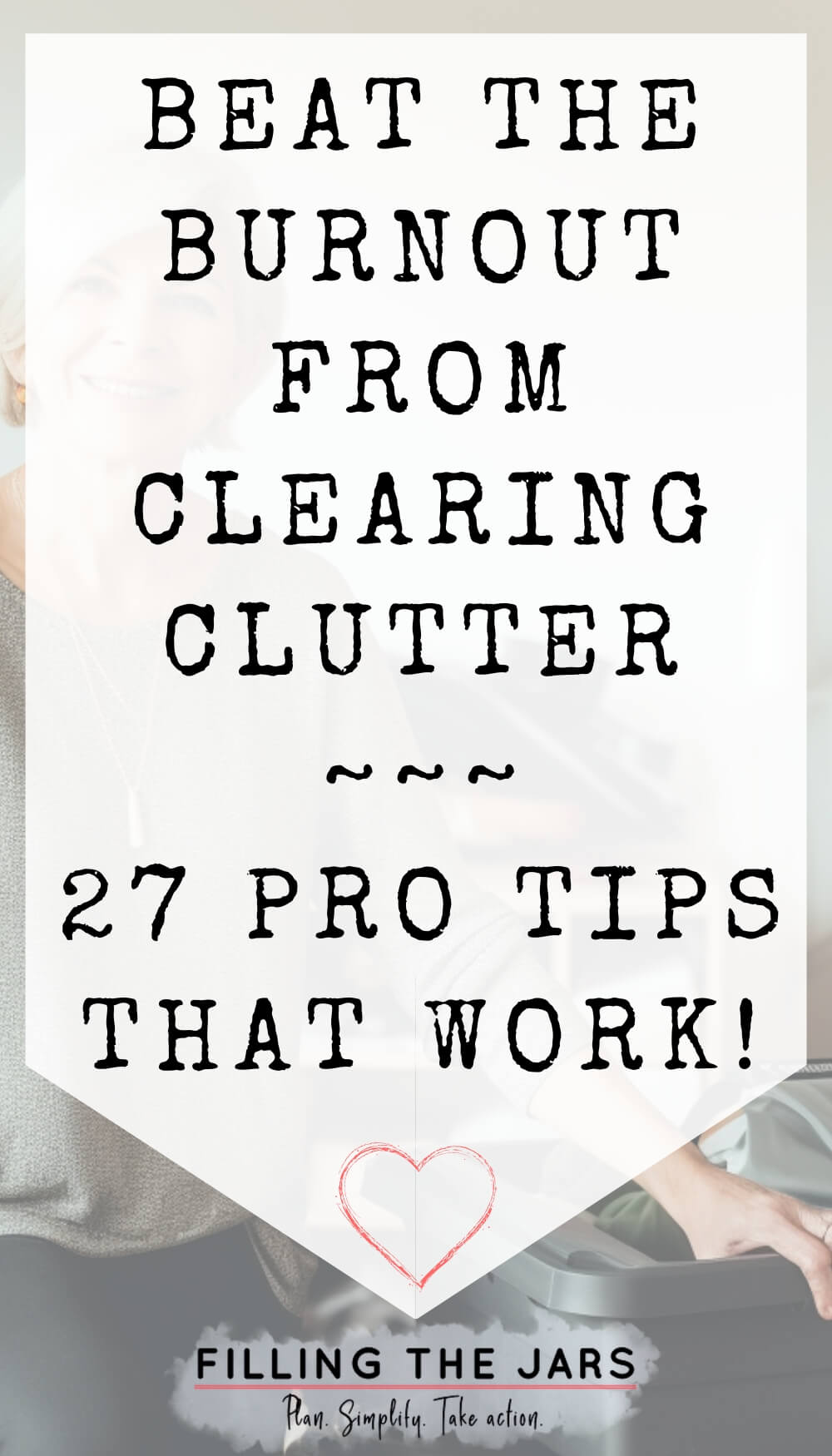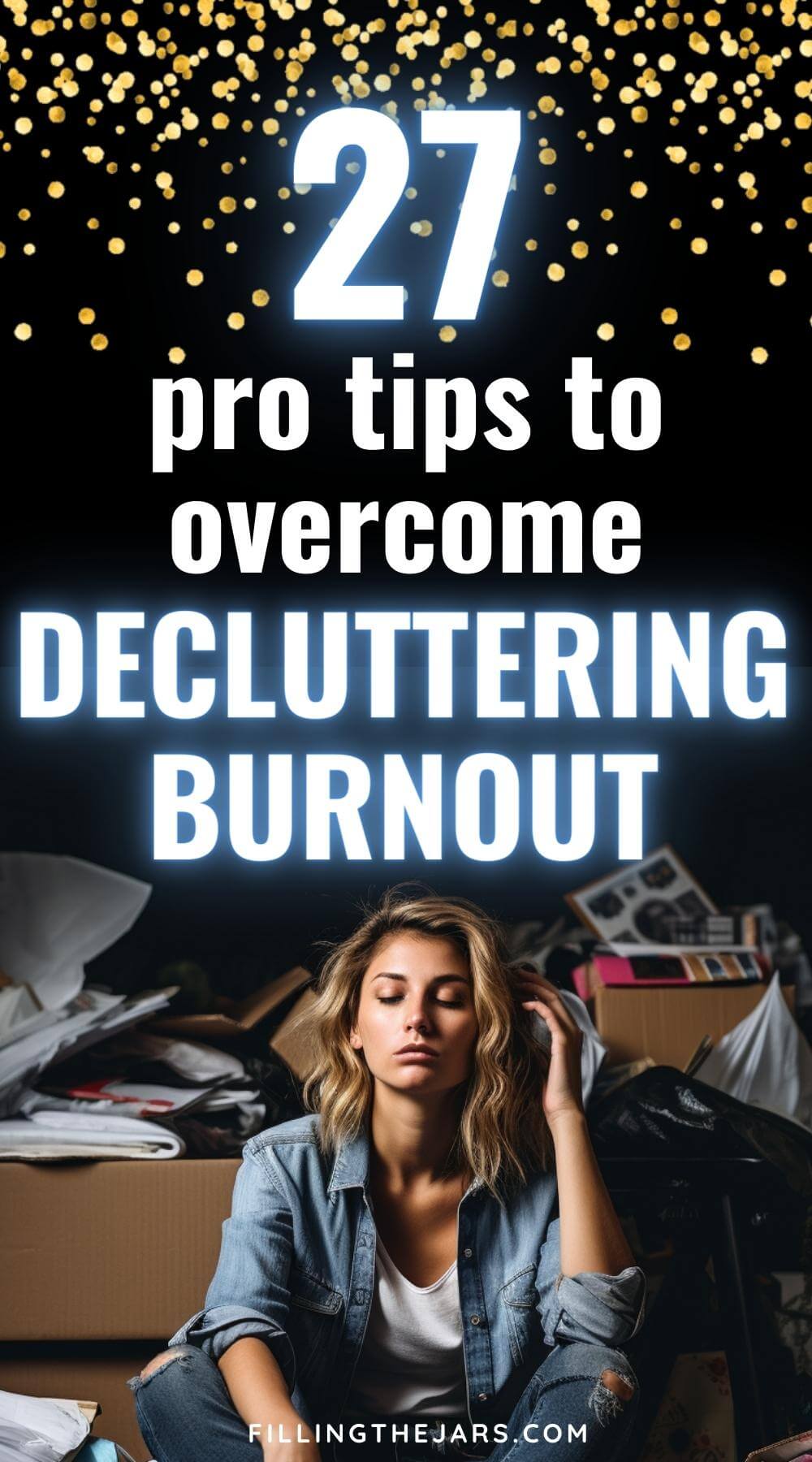Today we need to talk about decluttering burnout because the problem is REAL. We’ll cover what it is, what it isn’t, and strategies for dealing with it so that you can rekindle your decluttering spark!
Learning how to overcome burnout while clearing clutter is so important that I’ve included it as part of my comprehensive list of declutter tips. (Lots of ideas there if you need decluttering inspiration!)

This post may contain affiliate links. If you choose to purchase through an affiliate link, I may receive a small commission at no additional cost to you. This post is not to be taken as professional medical or mental health advice. All statements are strictly my personal life observations. You can see my full disclaimer here.
Let me guess… You were doing so well with your clutter-clearing efforts — working every day, dropping stuff off at the donation center regularly, and seeing progress. But then the decisions got harder, progress slowed, and now you’re at the point where you really just don’t care.
You kinda wish a fairy godmother would just come and take everything away, because you can’t see yourself making the effort to declutter even one. more. thing.
It’s called decluttering burnout, and rest assured that you’re not alone! It happens to most of us at some point in the decluttering journey.
Are you doomed to live in clutter forever because you can’t muster the energy to do anything about it?
Not at all. Let’s talk about that decluttering fatigue and what you can do about it…
Understanding Decluttering Burnout vs. Overwhelm
It’s vital to know that decluttering burnout is perfectly normal and can happen to anyone, regardless of how motivated they may be.
It’s also important to recognize the difference between burnout and overwhelm, as the two can often be confused. By identifying the root cause of your feelings, you can take steps to address them and move forward with your decluttering journey.
Identifying Decluttering Burnout
First things first, let’s get clear on what we mean by ‘decluttering burnout.’ It’s that feeling of physical, emotional, and mental exhaustion that results from prolonged – and often intense – decluttering activities. It’s not the same as being overwhelmed by the sheer volume of stuff – it’s more like hitting a decluttering wall.
This type of burnout can be caused by a variety of factors, such as unrealistic expectations, lack of progress, intense emotional attachment to items, or simply the length of time it *really* takes to declutter.
One of the key signs of decluttering burnout is a lack of motivation or interest in continuing with the decluttering process. You may find yourself procrastinating, avoiding the task altogether, or feeling like you just can’t face it.
Other signs of burnout include physical symptoms such as fatigue, headaches, and muscle tension, as well as emotional symptoms such as irritability, anxiety, or depression.
*note: If you suspect depression, please contact a mental health professional immediately.

Recognizing Overwhelm
Overwhelm, on the other hand, is a feeling of being flooded with too much information or too many tasks. It can be caused by factors such as lack of time, resources, or support.
Overwhelm can also be caused by external factors such as a sudden change in circumstances or unexpected events.
One of the key signs of overwhelm is a feeling of being stuck or ‘spinning’ or ‘churning,’ unable to make progress. You may find yourself struggling to prioritize tasks or feeling like you just can’t keep up with everything.
Like burnout, some other signs of overwhelm include physical symptoms such as tension, headaches, and fatigue, as well as emotional symptoms such as anxiety, frustration, and irritability.
One of the key differences between burnout and overwhelm is that burnout is a more chronic state of exhaustion, whereas overwhelm is more acute and can be relieved by taking a short break to step back from the situation.
Overwhelm can usually be managed by breaking tasks down into smaller, more manageable steps, while getting past burnout requires time and deeper interventions.
Accepting Decluttering Burnout as Normal
Decluttering burnout is a common experience for many people who embark on a decluttering journey.
And you know what? It’s absolutely okay to feel burnout. It doesn’t mean you’re failing or that you’re not cut out for this journey. It’s a phase that many of us experience, and it’s a sign that you’re pushing boundaries and challenging yourself.
Could you have prevented decluttering burnout? Possibly. But if you’re in the midst of a huge decluttering project, it’s pretty likely you would have hit that wall sooner or later. Now is not the time to second-guess yourself!
Your efforts have brought you this far, and you absolutely CAN overcome decluttering burnout. Let’s take a moment to remember that decluttering is a marathon, not a sprint. Others have faced this type of burnout and emerged stronger, and so can you.
If you are experiencing decluttering burnout, it’s important to give yourself permission to rest. Telling yourself that you *should* ‘just push through’ burnout can lead to more frustration and exhaustion, which can make it harder to continue with your decluttering journey.
Now that you can recognize the symptoms of decluttering burnout, and you understand that it’s often a normal part of the process, let’s talk about a whole bunch of ideas you can use to recover and begin moving forward again.

Strategies To Overcome Decluttering Burnout
Although feeling decluttering burnout is a normal experience, it’s important to know how to deal with it.
Overcoming this emotional and motivational barrier requires strategies that address the core feelings of apathy, overwhelm, and burnout. Dealing with deep-seated feelings of burnout, especially when paired with apathy, requires a layered — and sometimes intense — approach.
Here are some tailored suggestions to address decluttering burnout:
1. Take a Genuine Break
Unless you’re on a tight deadline like having to declutter for moving, It’s okay to set the clutter-clearing aside for a while. Take a week or two off (or longer) without feeling guilty. This is the time for survival mode and your emotional well-being is top priority.
As Edgar Albert Guest said, ‘…rest if you must, but don’t you quit.’ Fully believe that you’ll get back to the decluttering, try some of the next things on this list, and focus on living your life.
2. Acknowledge Your Progress
Sometimes, we focus too much on what’s left to be done rather than celebrating how far we’ve come. Create a visual representation of your progress — like a photo timeline or a journal — and revisit it when you feel down.
If you’ve been tracking the things you let go of while decluttering, total up how much you’ve gotten rid of. I’ll bet it’s impressive!
If you haven’t been tracking, grab my free quick-start mini decluttering plan and print out the tracking sheet so you can start when you’re ready to purge more clutter.
3. Nature Immersion
Spend an extended period in nature, like camping or hiking for a few days. The beauty and calmness of nature can provide a stark contrast to the chaos of clutter, reigniting the desire for simplicity.
4. Phone a Friend
Talk to someone you trust about how you’re feeling. Sometimes verbalizing your emotions and having someone listen can be therapeutic. This can be a friend, family member, partner… maybe even your furry BFF.
5. Learn Some Mindfulness and Meditation
Practicing mindfulness can help in grounding yourself and dealing with feelings of exhaustion. Guided meditations specifically designed for stress or burnout can be particularly helpful.
6. Embrace Imperfection
Recognize that decluttering is a process, and it doesn’t need to be perfect. You’re not always going to make the ‘right’ decisions for every item. You may have to do several ‘rounds’ of decluttering. Your organizing may not immediately work out the way you first envisioned. And it may take longer than you expected.
It’s all normal… and you’ll find a way to make it work in the end!
7. Focus on Creativity
Take a break from clearing clutter and focus on something creative such as writing, painting, or even dancing. This is perfect… especially if you’ve come across some ‘creative supplies’ during your previous decluttering that you just couldn’t let go of. Now is the time to put them to use!

8. Shift Your Environment
If you can, spend time away from the cluttered environment. Even if it’s just a day or a weekend away, a change of scenery can rejuvenate you and provide a fresh perspective.
9. Reconnect with Your Why
Reflect on why you wanted to declutter in the first place. Was it for peace of mind? More space for activities? Safety? Getting really clear on this can reignite or build some motivation.
10. Seek Inspiration
Look for new ways to declutter, read a book on minimalism, or watch a YouTube video on organizing. My favorite thing to do is watch a few episodes of Hoarders and then I usually feel seriously ready to declutter my own space. Sometimes hearing others’ stories can reignite the spark.
11. Reframe Your Perspective
Rather than seeing decluttering as a task or chore, view decluttering as an act of self-care. This mental shift can make the process feel more like a gift to yourself than a burden.
12. Digital Detox
The overwhelm from physical clutter can be magnified by our digital devices and all of the perfectly-curated spaces that show up in our social media feeds. Taking a break from digital devices can help reset your emotional state and reduce feelings of burnout or inadequacy.
13. Engage in Intense Physical Activity
Much like the suggestion for incorporating more creativity, getting physical can really clear your mind. Sometimes — if you’re in good physical condition — intense physical activities like a rigorous workout, long run, or even something like a dance class can shake off feelings of stagnancy and apathy.
14. Deep Emotional Exploration
Before diving into decluttering again, take time to deeply explore the emotional reasons behind your clutter. Clutter is often a physical manifestation of inner emotional states or unresolved issues. Journaling, introspective meditation, or even professional therapy can help you uncover these roots.
15. Affirmations and Mantras
Create a solid personal mantra or affirmation for your decluttering goals. Repeat this daily to slowly shift your mindset and build your decluttering confidence and resolve.
16. Rearrange the Furniture
Sometimes, a radical change in your space can jolt you out of apathy. Consider rearranging furniture or repainting walls. The novelty can spark motivation and offer a fresh canvas for your clutter-free goals.
17. Join a Group
Whether online or in person, joining a group focused on decluttering or minimalism can provide camaraderie and motivation. It can be reassuring to know others face the same challenges.
18. Sentimental Connection
Identify items that evoke strong emotions, whether positive or negative. This is especially important when you’re at the stage of decluttering sentimental items. Spend some time reflecting on these items separately. It might be easier to declutter once you’ve processed these emotions.
19. Set Smaller Goals
If the thought of decluttering an entire room feels daunting, aim to clear one small pile or even just one item. Reducing the scale of the task can make it more approachable. This is also why I recommend slow decluttering!

20. Decluttering Boot Camp
Check if there are decluttering or minimalism ‘bootcamps’ that appeal to you. Immersing yourself in an environment dedicated to decluttering, surrounded by like-minded individuals, can be a powerful reset.
21. Practice Habit-Formation Techniques
Adopt techniques from behavioral psychology to build the habit of decluttering. The book ‘Atomic Habits’ by James Clear offers valuable insights. The core idea is to make the habit attractive, easy, and satisfying.
22. Practice Making Decisions
At its core, decluttering is ALL about decision-making. But if you’re an overwhelmed overthinker, that can really be exhausting and energy-sapping.
There are a couple of things you can do.
- Pre-make some decisions about clutter, like whether you will donate or try to sell your stuff. (Hint: donating removes so.much. mental stress.)
- Practice making faster decisions in everyday life. Learning how to make decisions faster without regret is a skill that will serve you well every.single.day.
23. Reward System
Create a reward system where you treat yourself after reaching certain milestones, but ensure these rewards don’t contribute to more clutter!
24. Find an Accountability Buddy
Enlist a friend or family member to help keep you accountable and motivated. They might be someone who can be there in person, or on a video chat while you’re decluttering, or someone you can send text message updates to and keep yourself on track.
One caveat: Make sure this person knows and supports your decluttering goals. You don’t want to get on a decluttering roll and have your accountability buddy questioning every.single.item. you want to let go.
25. Have Fun with Music
Listen to an upbeat playlist while decluttering to make the task more enjoyable. Actually, listening to great music can affect your mood in a positive way even if you’re not quite ready to get back into decluttering yet. There’s never a bad time for good music. 😉
26. Intensive Therapy or Coaching
Consider short-term intensive therapy sessions focused on your feelings towards clutter and burnout. Therapists can provide coping mechanisms and insights tailored to you.
27. Professional Organizing Help
This may feel like a last resort, but it’s always an option! Hiring a professional organizer or decluttering coach can provide a fresh perspective, new techniques, and sometimes emotional support. Hiring a professional can be incredibly helpful in getting the job done quickly and efficiently.
Remember, you’re not a decluttering machine.
When you’re feeling deeply entrenched in burnout, it’s essential to recognize that there’s no quick fix. It might require a combination of the above strategies and time. The journey can be as much about personal growth and self-discovery as it is about decluttering physical items.
By implementing these tips, you can overcome decluttering burnout and continue your decluttering journey.
More Decluttering Help
Do These 3 Things When You’re Overwhelmed By Clutter
11 Top Tips For How to Start to Declutter a Room
8 Strategies To Use When Your Partner Refuses to Declutter
5 Wardrobe Management Tips To Always Have An Organized Closet
Next Decluttering Steps
When you’re going through decluttering burnout, you might be wondering, ‘Is it even worth continuing to try decluttering?
Oh, the doubts — we’ve all had them. Is this decluttering journey really worth it? The answer is a resounding YES. Remember the calm you felt when you cleared your workspace or that sigh of relief when you found exactly what you needed? Those are the gems you’re working towards.
So, for now, embrace that burnout as a sign that you’re pushing boundaries, learning, and evolving. You’ve got the tools now to rise above it – pause, and then implement the strategies that most appeal to you.
This journey is worth every moment, and I absolutely believe you CAN succeed. Your clutter-free haven is waiting.
You’ve got this!
Submit the form below to have my free printable quick-start mini decluttering plan sent right to your inbox…
Did you enjoy this post? Know someone else who might like it? Please take a moment to share on Pinterest, Facebook, or your favorite social media… (Click the sharing buttons at the bottom of the post.) Thank you!




iv bn unpacking, and/ or decluttering every single day since april 1st. i just realized i DO hve decluttering burnout!
thank you for helping me realize this; and that its ok to take a few days off without feeling guilty.
We did a lot of decluttering when we recently moved and now that we have a small, 4-room living area, I have decided on that should I want a new item in the house, that means 3 others need to go first.
Thank you for sharing your links with us at #275 SSPS Linky. See you again next week.
Fantastic ideas for staying motivated and giving yourself some grace. I needed this today! I’d love to invite you to my Tell It To Me Tuesday link party. It runs from Tuesday – Friday every week.
These are great pro tips, I appreciate you compiling these. These are going to be so helpful to me.
visiting today from SSPS 275 #87
This is exactly what I needed to help me get back on track! Thank you!